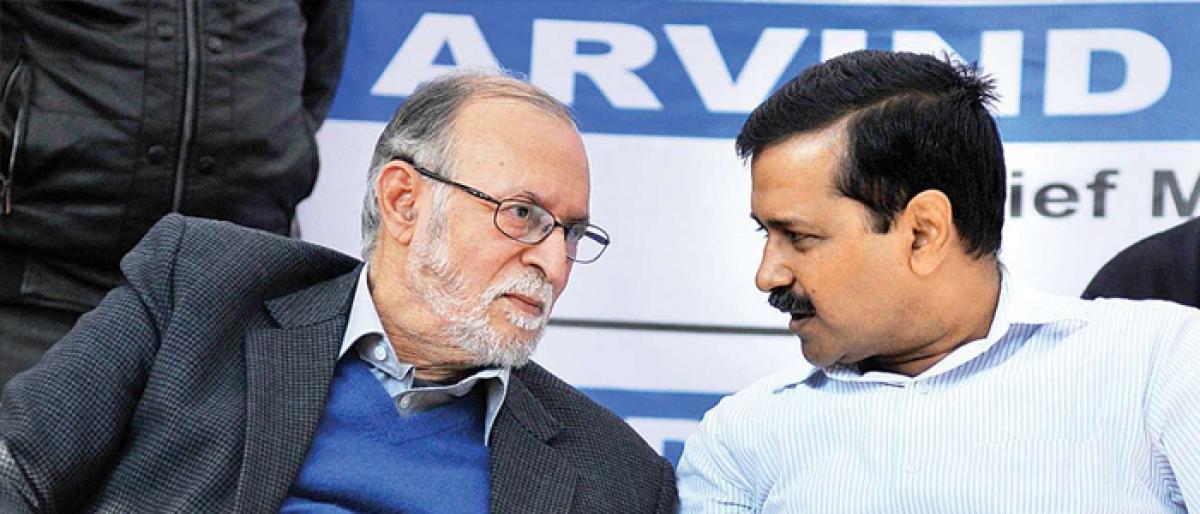Live
- Oppn misleading people, says PM
- Telangana CM Revanth Reddy Suggests Prioritizing the Most Needy for Indiramma Housing Scheme
- Telangana School Holiday: SFI Announces Bandh on November 30 Over Food Poisoning Cases
- NIT Warangal Library Trainee Recruitment: Last Date for Applications Tomorrow
- Singareni Recruitment 2024: Notification for 64 Internal Job Vacancies Application Deadline Announced
- A Teenager's Fight for Justice: Hyderabad Court Sentences Father to Life for Heinous Crime
- The Role of AI in Diagnostics, Treatment, and Patient Care
- Freshers’ Day Celebrations at Palem Agricultural Polytechnic College.
- Pearl Academy and Tech Mahindra Collaborate to Establish Makers Lab in Bengaluru
- “The Best Time to Start Retirement Planning is Now”, Says HDFC Life’s Latest Campaign
Just In

As the tussle between the AAP government and the Lieutenant Governor (LG) escalates, the vexatious issue as to who enjoys supremacy over Delhi has always been a bone of contention.
New Delhi: As the tussle between the AAP government and the Lieutenant Governor (LG) escalates, the vexatious issue as to who enjoys supremacy over Delhi has always been a bone of contention.
The Delhi High Court ruled that the national capital remains a Union territory with the LG as its "administrative" head. But the AAP government was not impressed and took the matter to the apex court, which set up a five-judge constitution bench.
The top court had heard the matter for 15 days and had reserved its verdict on December 6, 2017on appeals against the high court's 2016 verdict which had held that the LG enjoyed primacy in governance.
However, the ongoing power tussle between the Delhi and Centre, represented by LG Anil Baijal, is refusing to die down as Chief Minister Arvind Kejriwal and his ministers sat on dharna and spent Monday night at the LG's office to press for their demands including issuance of a direction to IAS officers to end their "strike".
It is noteworthy that the high court, in its verdict, had extensively dealt with constitutional scheme and other laws relating to Delhi and had held that it becomes manifest that Delhi continues to be a Union territory even after the Constitution (69th Amendment) Act, 1991 inserting Article 239AA making special provisions with respect to Delhi".
Dealing with the scope of powers, it had held that the Delhi government was mandated under the Constitution to communicate its decisions to the LG even in the case of the legislative powers of the assembly to make laws.
A law passed by the assembly will come into effect only when the LG does not take a "different view", it had said.
On the authority to set up Commission of Inquiry, the high court had held that any such order would be "illegal" if they are passed "without seeking the views/concurrence" of the LG.
The high court had also not allowed the Delhi government's plea to oppose Centre's notification to exclude central government employees from the purview of its Anti-Corruption Branch (ACB).
It had held that service matters fall outside the purview of Legislative Assembly and Centre's May 21, 2015 notification barring the ACB from proceeding against Central government employees was "neither illegal nor unconstitutional".
The high court had not approved of the AAP government's decision to appoint its nominees as directors on the boards of private discoms, saying it lacked LG's sanction.
It had termed as "illegal and unconstitutional" the policy decision of the city government empowering the Delhi Electricity Regulatory Commission to impose fine on discoms in the event of disruption of power supply on the ground that the LG was not on board.
The AAP government's decision to revise stamp duty rates for sale and transfer of agriculture land was also struck down on the same ground.
Dealing with Article 239AA, which deals with Delhi, it had said the position of the LG was different from Governors of states and the LG may act in his discretion with regard to all the matters in respect of which he is required to act in his discretion 'by or under any law'.
It is not possible to hold that the LG is bound to act only on the aid and advice of the Council of Ministers, it had held.
Referring to the Delhi's transaction of business rules, the high court had said it was always open to the LG to "differ with the decision of the Council of Ministers, in which event, he has to follow the procedure as prescribed" under the rules.
It, however, had held that the city government that the LG will have to act on its aid and advice in appointment of special public prosecutors.
The verdict was assailed by the Kejriwal government in the top court, saying that it possessed both legislative and executive powers in administering the national capital.
The five-judge bench headed by Chief Justice Dipak Misra is yet to deliver the verdict.

© 2024 Hyderabad Media House Limited/The Hans India. All rights reserved. Powered by hocalwire.com







